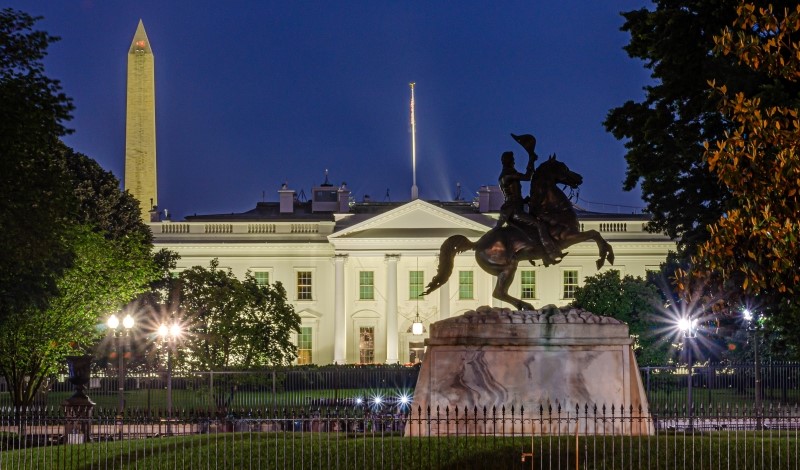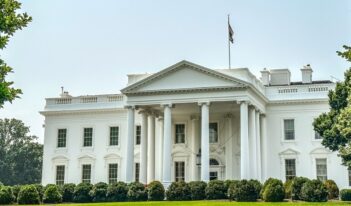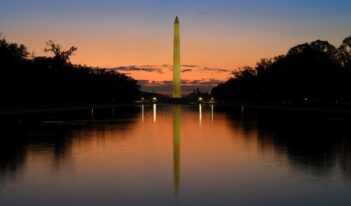
The Supreme Court’s recent decision on presidential immunity threatens the survival of the American Republic.
If the American Republic falls in the next few years—after its founding almost a quarter of a millennium ago—then the most immediate cause will be former President Donald J. Trump returning to power by winning what the polls predict will be a close election in November. But the Supreme Court will have aided and abetted the collapse.
Even at the very start of his political career, Donald Trump showed the signs of a wannabe tyrant. His lengthening rap sheet of lawless conduct, including felony convictions for falsifying business records to hide campaign finance violations, as well as liability for sexual assault and massive financial fraud, have only reinforced this impression.
If restored to power, former President Trump will no doubt make good on his promise to exact “retribution” on his enemies. There is little reason to think that he has learned any lessons from punishment for his lawless behavior in the past, and we can only expect more “high crimes and misdemeanors” if Trump wins election. He makes no secret of his authoritarian intentions if he returns to power, promising to “prosecute” his enemies, including President Joe Biden, and to become “a dictator” on “day one.” He continues to express admiration for autocrats such as Vladimir Putin of Russia, Xi Jinping of China, and Viktor Orbán of Hungary.
Of course, if the American Republic falls into a dictatorship, those U.S. Senators who voted to acquit Trump on his two impeachments, including most prominently Senator Mitch McConnell (R-Ky.) will bear some part of the historical blame. However, it has now become painfully clear that a Trump tyranny, if it comes, will have been enabled by what one might have thought to be an unlikely institutional source: the U.S. Supreme Court. Even if former President Trump does not win, the Court has handed a “loaded weapon” to another future President who might be tempted by selfishness, greed, or perceived public emergency to become a lawless dictator.
One might have expected the Supreme Court instead to uphold the rule of law—including the most important kind of law for a republic, the constitutional law that preserves its essential structure of separation of powers. Shockingly, even to those of us inured to a recent series of terrible Court decisions that have blithely tossed out decades of precedent to impose the Court’s own will—most strikingly, the overruling of Roe v. Wade’s right to abortion and the evisceration of Chevron deference to administrative agencies—the Court has now dealt a near-fatal blow to the prosecution of former President Trump for his attempts to reverse by multiple means the outcome of the 2020 vote against him. The alleged crimes include an illegal pressure campaign against government officials to change the voting results in several key swing states and a violent assault on the U.S. Capitol to interfere with the congressional certification of the election on January 6, 2021.
In Trump v. United States, the majority of the justices on the Court—all of whom were appointed by President Trump or other Republican Presidents—held that Trump likely has immunity from criminal liability for most if not all of his attempts at an insurrection. The Court has said, in effect, that it alone has the authority to decide whether specific alleged criminal actions by a former President committed while in office are immune from challenge as either “core constitutional” powers or “official actions.” These exercises of presidential power, says the Court, cannot be challenged even when they allegedly violate serious criminal laws.
Presidents acting in their constitutional role are in this way elevated above the law. As Justice Sonia Sotomayor says in her dissenting opinion, the Court creates a “law-free zone around the President, upsetting the status quo that has existed since the Founding.”
Specifically, the Court’s majority held, with respect to an alleged conspiracy to pressure state officials to change electoral vote allocations, that Trump is “absolutely immune from prosecution for the alleged conduct involving his discussions with Justice Department officials.” The Court also held that allegations that Trump illegally pressured Vice President Mike Pence to reject the certified electoral votes of key states are entitled to a “presumption of immunity.” The Court remanded other charges to the trial court to determine whether its new doctrines of presidential immunity apply or not.
In the Court’s majority opinion, Chief Justice John Roberts observes correctly that this important case is one of first impression: “the first criminal prosecution in the Nation’s history of a former President for actions taken during his Presidency.” However, he and others in the majority do not appear to understand the true stakes—or, if they understand them, do not seem to care about the implications. Chief Justice Roberts recites the Special Counsel Jack Smith’s allegations but somehow fails to grasp their main meaning. Trump v. United States is an exactly descriptive caption because this vitally important case presents for the first time the issue of how the United States constitutional order will respond to an attempted self-coup—or what other countries call an autogolpe, a coup from within.
At this point, there is very little doubt about the underlying facts of former President Trump’s attempted autogolpe, although he deserves (another) fair trial as any criminal defendant does. President Trump attempted to remain in power illegally through various measures detailed in both a report by the U.S. House Special Committee to Investigate the January 6th Attack and a Senate trial for impeachment at which 57 Senators voted to convict President Trump (short of the required two-thirds vote). The Special Counsel has built on this foundation of evidence and secured his federal indictment from a grand jury.
It is possible that Trump v. United States will have limited impact on the federal criminal cases against Trump because the Court’s majority opinion carves out the “unofficial actions” of a President as deserving neither absolute immunity nor a presumption of immunity. “As for a President’s unofficial conduct,” the Court states clearly, “there is no immunity.” The Court thus leaves the door open for former President Trump to be prosecuted for his actions as a private citizen to seek reelection by nefarious means, including illicitly interfering himself and asking other “private actors” to interfere with state election officials.
If former President Trump loses in November, the impact of Trump v. United States may be limited at least in the short term to legal interpretations about the scope of Trump’s criminal trials. For example, it is difficult to see how a former President as a private citizen retiring to Florida can legitimately claim presidential immunity for refusing to return highly classified documents, as alleged in the indictment of him in Florida. Similarly, although the Court’s holding in Fischer v. United States will likely knock out “obstruction of justice” charges against former President Trump under one federal statute, other charges involving his private conduct as a candidate will probably survive.
If former President Trump wins reelection, however, all bets are off. The greatest danger is that Trump v. United States will unleash even worse lawlessness than we have already witnessed. A restored President Trump will order his new Attorney General to dismiss the federal indictments against him. Then, the largest question will be how the new doctrines of presidential immunity will affect a second Trump Administration. The likely answer is not good.
History provides a guide. If the presidential immunity standards of Trump v. United States had applied, the facts of the criminal conduct underlying the scandals of Watergate and Iran-Contra would most likely not have come to light. No incriminating White House tapes would have been released, and no evidence of illegal payments paid to foreign rebels would have been revealed. The parade of horribles—political assassinations, military coups, and institutionalized bribery—that Justice Sotomayor describes is unfortunately quite possible.
Specifically, the Court provides absolute immunity for any criminal conduct alleged to take place with respect to the pardon power. This immunity will predictably encourage an unscrupulous President to make pardons transactional, including by bribery and as a reward for crimes committed based on loyalty. A Godfather President has been made possible, ironically through the Court’s overbroad reading of a case upholding President Abraham Lincoln’s power to pardon former Confederate insurrectionists.
In addition, preemptive immunity for any conversations with U.S. Department of Justice officials and others will only make Trump’s promised use of executive powers to exact retribution against his enemies more likely. Under the Court’s new immunity doctrines, it is possible that members of the Internal Revenue Service, the Federal Bureau of Investigation, and other federal agencies could become the President’s henchmen rather than officers of the law.
In this sense, Justice Sotomayor’s “nightmare scenarios” are real risks. Although some observers (including me) might be characterized as “democratic alarmists,” Justice Ketanji Brown Jackson is right that the Court’s opinion creating broad presidential immunity is “a five-alarm fire that threatens to consume democratic self-governance.” Sometimes calling out an alarm is justified, and Trump v. United States really does cast—as Chief Justice Roberts unintentionally but aptly calls it—a “chilling doom.”
One can also imagine what would be, for Republicans who have not drunk the Trump Kool-Aid, a different nightmare scenario enabled by the decision. The climate emergency, if the world continues to ignore it, could well bring massive migrations of climate refugees, wars for food and water, and increased global political inequality and instability. A future President may find these developments sufficiently dire as to necessitate a “climate leviathan” that would overthrow our constitutional order and rule of law.
Not for nothing does Justice Sotomayor conclude her opinion with a line unprecedented in any Supreme Court decision in our history: “With fear for our democracy, I dissent.”
In the final analysis, the Supreme Court majority in Trump v. United States proves itself both arrogant and naïve. It is arrogant in its claim that it alone has the authority to decide not only “what the law is” (under the famous formulation of Marbury v. Madison) but also “whether and when the law applies”—at least to the person who occupies the most powerful office in the land. The Court has in this way set itself above the Constitution, as well as Congress and the Executive (including the Justice Department).
Rather than a nation governed under the law, the Court decides that we should have rule by the Court and an unleashed President. The Court alone gets to say not only what the law means—what the law “is”—but also to whom the law will apply. The Court forgets the lessons of its own history and turns toward “government by judiciary” or, pejoratively, a “judicial despotism,” with “the essence of despotism” defined as “the right of a few to make the laws or to control their making, without being responsible to the people.”
This dark dream of judicial power is also naïve in the same way that many who enable dictators on their way up historically are naïve. Consider, for example, some of the Russian oligarchs who got on the wrong side of Vladimir Putin.
The justices in the Supreme Court’s majority imagine the unchecked executive power that they enable will remain tame, at least toward them. They forget other lessons of history—lessons that many wealthy businesspeople backing former President Trump should also remember before it is too late for them as well. Tyrants are not loyal to others. They demand loyalty from others—or else.
A hypothetical that arose at oral argument is now worth considering in a different vein. Trump’s lawyer was asked if a presidential order to Navy SEAL Team Six to assassinate a political rival could have executive immunity from prosecution under their theory of the case. Stunningly, the answer was “yes”—or at least “maybe.”
The Court does not address this hypothetical in its opinion—saying only that such talk amounts to “fear mongering”—and it does not set any clear guidelines that would rule it out. When and if the times comes, the Court itself will decide. “It depends,” as Justice Jackson’s dissent puts it. As Justice Sotomayor says, also in dissent, a claim of immunity is possible to contemplate even for presidentially ordered domestic assassinations. And if not, why does the Court’s majority not say so?
The Court is naïve in thinking that the same hypothetical situation could not turn even on itself. What if a future President Trump, or some other future President, decides that a Supreme Court justice has become a threat to national security? What if the President orders a hit on them? What barriers or checks on a President’s power to order any killings whatsoever will remain? Certainly, dead Supreme Court justices will not have much to say about them. The precedent of Trump v. United States could be invoked to provide presidential immunity for all crimes claimed to touch upon a vague and therefore potentially broad “constitutional core” of executive powers or to constitute “official actions” of the President as Commander in Chief.
This result, as Justice Jackson’s dissent best explains, enables “autocracy.” No longer does “individual accountability” apply to Presidents just as it does to every other citizen. A special, newly forged “presidential accountability” standard “undermines the constraint of law as a deterrent for future Presidents who might otherwise abuse their power, to the detriment of us all.”
The potential consequences of this decision are indeed chilling. The terrible truth is that the new “official” presidential immunity could spawn a hell on Earth of lawless death squads, purchased pardons, perverted prosecutions, and corrupted judges and government officials.
If this Orwellian future comes to pass, the Supreme Court will have played a key role in enabling it.
There is, of course, one remaining remedy. At the end of the day, political outcomes depend, as long as the electoral machinery of our American Republic remains operational, on the expressed will of the people. Perhaps an unintended consequence of the Court’s truly frightening decision in Trump v United States will be to awaken American citizens to the immediate danger that we now face to our so-easily-taken-for-granted freedoms and our way of life under the rule of law. Perhaps the terror of the possible consequences of the Court’s decision in Trump v. United States can cut through some of the fog impeding modern democratic will formation. Too many people are distracted by digital entertainment technologies and misinformation, or sundry self-interested pursuits, leaving too little time to care about law or politics.
We are at a crossroads today as significant as in the post-Dred Scott era prior to the advent of the Civil War. Trump can be defeated again. He can be relegated to history as an infamous but failed threat to our constitutional order. If Trump loses, the enabling Supreme Court that seeks further to empower him can then be changed too. But only if “We the People” rise up in November and say: “Yes, it’s a republic we still have, and we want to keep it.”
This essay is part of a series, titled The Supreme Court’s 2023-2024 Regulatory Term.




